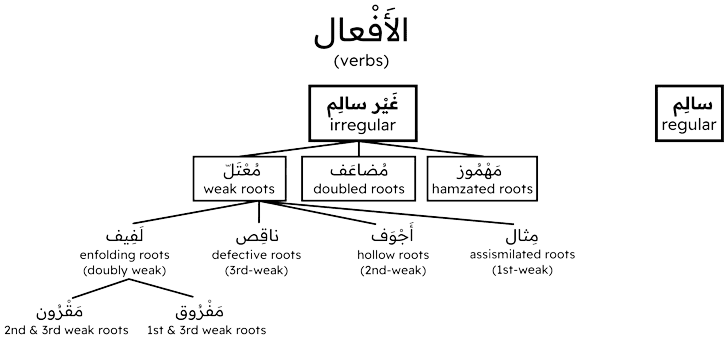Irregular verbs / الأَفْعال غَيْر السالِمة

Amongst the irregular verbs in Arabic, some root words are classified as “healthy” (صَحِيح), and others are labeled as “weak” (مُعْتَلّ) litt. diseased.
- Irregular verbs with healthy roots either have:
- A doubled root, meaning the two last root-letter are merged into one and written with a shadda, like مَدَّ (to extend/spread out).
- A hamza as the first, second, or third root letter:
| أَكَلَ to eat | سَأَلَ to ask/enquire | قَرَأَ to read |
- The weak three-letter roots feature either a و or ي (or both).

Hamzated roots / الفِعْل المَهْموز
There are three categories of hamzated root verbs:
- Verbs with a hamza as the 1st root-letter
- Verbs with a hamza as the 2nd root-letter
- Verbs with a hamza as the 3rd root-letter
Verbs of this type can prove to be troublesome due to the need for proper hamza support, which is dependent upon vowels and the surrounding environment.
Verbs with a hamza as the 1st root-letter
Augmented forms table
| Nouns / أَسْماء | Verbs / أَفْعال | الوَزْن Form | المَعْنى Meaning | ||||
|---|---|---|---|---|---|---|---|
| المَصْدَر Verbal noun | اِسْمُ المَفْعُول Passive Participle (recipient) | اِسْمُ الفاعِل Active Participle (agent) | الأَمْر Imperative | المُضارِع Imperfect (present) | الماضي Perfect (past) | ||
| أَكْلٌ | مَأْكُولٌ | آكِلٌ | كُلْ | يَأكُلُ | أَكَلَ | I | to eat |
| تَأْكِيدٌ | مُؤَكَّدٌ | مُؤَكِّدٌ | أَكِّدْ | يُؤَكِّدُ | أَكَّدَ | II | to assert |
| مُؤاخَذةٌ | مُؤاخَذٌ | مُؤاخِذٌ | آخِذْ | يُؤاخِذُ | آخَذَ | III | to blame |
| إِيمانٌ | مُؤْمَنٌ | مُؤْمِنٌ | آَمِنْ | يُؤْمِنُ | آمَنَ | IV | to believe / to have faith |
| تَأَمَُلٌ | مُتَأَمَّلٌ | مُتَأَمِّلٌ | تَأَمَّلْ | يَتَأَمَّلَ | تَأَمَّلَ | V | to meditate |
| تَآمُرٌ | مُتَآمَرٌ | مُتَآمِرٌ | تَآمَرْ | يَتَآمَرَ | تَآمَرَ | VI | to conspire |
| N/A | N/A | N/A | N/A | N/A | N/A | VII | N/A |
| اِتَّخَاذٌ | مُتَّخَذٌ | مُتَّخِذٌ | اِتَّخِذْ | يَتَّخِذُ | اِتَّخَذَ | VIII | to take/ to adopt |
| N/A | N/A | N/A | N/A | N/A | N/A | IX | N/A |
| اِسْتِأْذانٌ | مُسْتَأْذَنٌ | مُسْتَأْذِنٌ | سْتَأْذِنْ | يَسْتَأْذِنُ | اِسْتَأْذَنَ | X | to ask permission |
Verbs with a hamza as the 2nd root-letter
Augmented forms table
| Nouns / أَسْماء | Verbs / أَفْعال | الوَزْن Form | المَعْنى Meaning | ||||
|---|---|---|---|---|---|---|---|
| المَصْدَر Verbal noun | اِسْمُ المَفْعُول Passive Participle (recipient) | اِسْمُ الفاعِل Active Participle (agent) | الأَمْر Imperative | المُضارِع Imperfect (present) | الماضي Perfect (past) | ||
| سُؤَالٌ | مَسْؤُولٌ | سائِلٌ | سَل / اِسْأَلْ | يَسْأَلُ | سَأَلَ | I | to ask / to inquire |
| تَرْئِيسٌ | مُرَئَّسٌ | مُرَئِّسٌ | رَئِّسْ | يُرَئِّسُ | رَأَّسَ | II | to appoint as chief or head |
| مُلاءَمةٌ | مُلاءَمٌ | مُلائِمٌ | لَائِمْ | يُلائِمُ | لاءَمَ | III | to accommodate |
| إكْآبٌ | مُكْأبٌ | مُكْئِبٌ | أَكْئِبْ | يُكْئِبُ | أَكْأَبَ | IV | to sadden |
| تَرَؤُّسٌ | مُتَرأَّسٌ | مُتَرَئِّسٌ | تَرَأَّسْ | يَتَرَأَسُ | تَرَأَسَ | V | to preside |
| تَساؤُلٌ | مُتَساءَلٌ | مُتَسائِلٌ | تَسَاءَلْ | يَتَسَاءَلُ | تَساءَلَ | VI | to wonder / to ask oneself |
| N/A | N/A | N/A | N/A | N/A | N/A | VII | N/A |
| اِبْتِئاسٌ | مُبْتَأَسٌ | مُبْتَئِسٌ | اِبْتَئِسْ | يَبْتَئِسُ | اِبْتَأَسَ | VIII | be afflicted |
| N/A | N/A | N/A | N/A | N/A | N/A | IX | N/A |
| اِسْتِرْآفٌ | مُسْتَرْأَفٌ | مُسْتَرْئِفٌ | اِسْتَرْئِفْ | يَسْتَرْئِفُ | اِسْتَرْأَفَ | X | to beg for mercy |
Verbs with a hamza as the 3rd root-letter
Augmented forms table
| Nouns / أَسْماء | Verbs / أَفْعال | الوَزْن Form | المَعْنى Meaning | ||||
|---|---|---|---|---|---|---|---|
| المَصْدَر Verbal noun | اِسْمُ المَفْعُول Passive Participle (recipient) | اِسْمُ الفاعِل Active Participle (agent) | الأَمْر Imperative | المُضارِع Imperfect (present) | الماضي Perfect (past) | ||
| قِراءَةٌ / قُرْآنٌ | مَقْروءٌ | قارئٌ | اِقْرَأْ | يَقْرَأُ | قَرَأَ | I | to read |
| تَخْبِئَةٌ | مُخَبَّأٌ | مُخَبِّئٌ | خَبِّئْ | يُخَبِّئُ | خَبَّأَ | II | to hide (smthing) |
| مُفاجَأةٌ | مُفاجأٌ | مُفاجِئٌ | فَاجِئْ | يُفاجِئُ | فاجَأَ | III | to surprise |
| إِطْفاءٌ | مُطْفَأٌ | مُطْفِئٌ | أَطْفِئْ | يُطْفِئُ | أَطْفَأَ | IV | to turn off |
| تَجَزُّؤٌ | مُتَجَزَِّأٌ | مُتَجَزِِّئٌ | تَجَزَّأْ | يَتَجَزَّأُ | تَجَزَّأَ | V | to split |
| تَكافُؤٌ | مُتَكافَأٌ | مُتَكافِئٌ | تَكَافَأْ | يَتَكافَأُ | تَكافَأَ | VI | to balance each other |
| اِنْطِفاءٌ | مُنْطَفَأٌ | مُنْطَفِئٌ | اِنْطَفِئْ | يَنْطَفِئُ | اِنْطَفَأَ | VII | to die out / to be estinguished |
| اِخْتِباءٌ | مُخْتَبَأٌ | مُخْتَبِئٌ | اِخْتَبِئْ | يَخْتَبِئُ | اِخْتَبَأَ | VIII | to hide (oneself) |
| N/A | N/A | N/A | N/A | N/A | N/A | IX | N/A |
| اِسْتِهْزاءٌ | مُسْتَهْزَأٌ | مُسْتَهْزِئٌ | اِسْتَهْزِئْ | يَسْتَهْزِئُ | اِسْتَهْزَأَ | X | to mock / to ridicule |
Doubled roots / الفِعْل المُضاعَف
The two last root letters are the same letter hence, written as one letter with a shadda.
Augmented forms table
| Nouns / أَسْماء | Verbs / أَفْعال | الوَزْن Form | المَعْنى Meaning | ||||
|---|---|---|---|---|---|---|---|
| المَصْدَر Verbal noun | اِسْمُ المَفْعُول Passive Participle (recipient) | اِسْمُ الفاعِل Active Participle (agent) | الأَمْر Imperative | المُضارِع Imperfect (present) | الماضي Perfect (past) | ||
| مَدٌّ | مَمْدودٌ | مادٌّ | مُدَّ | يَمُدُّ | مَدَّ | I | to extend / to spread out |
| تَشْدِيدٌ | مُشَدَّدٌ | مُشَدِّدٌ | شَدِّدْ | يُشَدِّدُ | شَدَّدَ | II | to emphasize |
| مُضادَّةٌ | مُضادٌّ | مُضادٌّ | ضادِدْ | يُضادُّ | ضادَّ | III | to be opposed to |
| إِمْلالٌ | مُمَلٌّ | مُمِلٌّ | أَمْلِلْ | يُمِلُّ | أَمَلَّ | IV | to bore |
| تَبَرُّرٌ | مُتَبَرَّرٌ | مُتَبَرِّرٌ | تَبَرَّرْ | يَتَبَرَّرُ | تَبَرَّرَ | V | to justify oneself |
| تَماسٌّ | مُتَماسٌّ | مُتَماسٌّ | تَماسَسْ | يَتَماسُّ | تَماسَّ | VI | to touch one another |
| اِنْسِدادٌ | مُنْسَدٌّ | مُنْسَدٌّ | اِنْسَدّدْ | يَنْسَدُّ | اِنْسَدَّ | VII | to clog up |
| اِشْتِدادٌ | مُشْتَدٌّ | مُشْتَدٌّ | اِشْتَدِدْ | يَشْتَدُّ | اِشْتَدَّ | VIII | to intensify |
| N/A | N/A | N/A | N/A | N/A | N/A | IX | N/A |
| اِسْتِخْفافٌ | مُسْتَخَفٌَ | مُسْتَخِفٌَ | اِسْتَخْفِفْ | يَسْتَخِفَُ | اِسْتَخَفَّ | X | to underestimate / to undervalue |
Weak roots / الفِعْل المُعْتَلّ
The weak three-letter roots feature either a و or ي (or both) in their root.
Note: Contrary to popular belief, the alif ا is not a weak letter or semi-vowel – making it an impossible candidate as a root letter! When looking at weak-rooted verbs, this character may serve as evidence of weakness and replaces the letters wāw or yāʾ.
قالَ يَقُول
to sayصاحَ يَصِيحُ
to shout
Assimilated (1st-weak) roots / الفِعْل المِثال
The first root letter is either a و or ي, and the و tends to disappear in imperfect tense المُضارِِع (except in the passive form). It may even transform into ي and vice versa. Furthermore, it could merge with ت of form VIII due to assimilation.
Augmented forms table
| Nouns / أَسْماء | Verbs / أَفْعال | الوَزْن Form | المَعْنى Meaning | ||||
|---|---|---|---|---|---|---|---|
| المَصْدَر Verbal noun | اِسْمُ المَفْعُول Passive Participle (recipient) | اِسْمُ الفاعِل Active Participle (agent) | الأَمْر Imperative | المُضارِع Imperfect (present) | الماضي Perfect (past) | ||
| وُجُودٌ | مَوْجُودٌ | واجِدٌ | جِدْ | يَجِدُ | وَجَدَ | I | to find |
| تَوْزِيعٌ | مُوَزَّعٌ | مُوَزِّعٌ | وَزِّعْ | يُوَزِّعُ | وَزَّعَ | II | to distribute |
| مُوافَقةٌ / وِفاقٌ | مُوافَقٌ | مُوافِقٌ | وافِقْ | يُوافِقُ | وافَقَ | III | to agree |
| إِيقادٌ | مُوقَدٌ | مُوقِدٌ | أَوْقِدْ | يُوقِدُ | أَوْقَدَ | IV | to ignite |
| تَوَحَُدٌ | مُتَوَحَّدٌ | مُتَوَحِّدٌ | تَوَحَّدْ | يَتَوَحَّدَ | تَوَحَّدَ | V | to isolate oneself |
| تَواضُعٌ | مُتَواضَعٌ | مُتَواضِعٌ | تَواضَعْ | يَتَواضَعَ | تَواضَعَ | VI | to be humble |
| N/A | N/A | N/A | N/A | N/A | N/A | VII | N/A |
| اِتِصالٌ | مُتَّصَلٌ | مُتَّصِلٌ | اِتَّصِلْ | يَتَّصِلُ | اِتَّصَلَ | VIII | to call / to contact |
| N/A | N/A | N/A | N/A | N/A | N/A | IX | N/A |
| اِسْتِيقافٌ | مُسْتَوْقَفٌ | مُسْتَوْقِفٌ | اِسْتَوْقِفْ | يَسْتَوْقِفُ | اِسْتَوْقَفَ | X | to halt / to cause to stop |
Hollow (2nd-weak) roots / الفِعْل الأَجْوَف
The 2nd root letter of these verbs is a semi-consonant (و and ي) which disappears when it is followed by a letter bearing the sukūn (السُكُون). The و and ي are often transformed into an alif ا in perfect tense forms whose last letter of the radical carries a vowel or for certain verbs in imperfect tense (مُضارِع). There are 3 main categories depending on the 2nd root letter of the imperfect tense المُضارِع which are و and ي or ا.
| نامَ يَنامُ to sleep | باعَ يَبِيعُ to sell | قالَ يَقُول to say |
Augmented forms table
| Nouns / أَسْماء | Verbs / أَفْعال | الوَزْن Form | المَعْنى Meaning | ||||
|---|---|---|---|---|---|---|---|
| المَصْدَر Verbal noun | اِسْمُ المَفْعُول Passive Participle (recipient) | اِسْمُ الفاعِل Active Participle (agent) | الأَمْر Imperative | المُضارِع Imperfect (present) | الماضي Perfect (past) | ||
| قَوْلٌ بَيْعٌ نَوْمٌ | مَقُولٌ مَبِيعٌ مَنُومٌ | قائِلٌ بائِعٌ نائِمٌ | قُلْ بِعْ نَمْ | يَقُولُ يَبِيعُ يَنامُ | قالَ باعَ نامَ | I | – to say – to sell – to sleep |
| تَخْوِيفٌ | مُخَوَّفٌ | مُخَوِّفٌ | خَوِّفْ | يُخَوِّفُ | خَوَّفَ | II | to scare |
| مُقاوَمةٌ | مُقاوَمٌ | مُقاوِمٌ | قاوِمْ | يُقاوِمُ | قاوَمَ | III | to battle against |
| إِرادةٌ | مُرادٌ | مُرِيدٌ | أَرِدْ | يُرِيدُ | أَرادَ | IV | to want |
| تَعَوُّدٌ | مُتَعَوَّدٌ | مُتَعَوِّدٌ | تَعَوَّدْ | يَتَعَوَّدُ | تَعَوَّدَ | V | to get used to |
| تَشاوُرٌ | مُتَشاوَرٌ | مُتَشاوِرٌ | تَشاوَرْ | يَتَشاوَرُ | تَشاوَرَ | VI | to consult |
| اِنْقِيادٌ | مُنْقادٌ | مُنْقادٌ | اِنْقَدْ | يَنْقادُ | اِنْقادَ | VII | to yield / to follow |
| اِخْتِيارٌ | مُخْتارٌ | مُخْتارٌ | اِخْتَرْ | يَخْتارُ | اِخْتارَ | VIII | to chose |
| اِسْوِدادٌ | N/A | مُسْوَدٌّ | اِسْوَدَّ | يَسْوَدُّ | اِسْوَدَّ | IX | to blacken |
| اِسْتِطاعةٌ | مُسْتَطاعٌ | مُسْتَطِيعٌ | اِسْتَطِعْ | يَسْتَطِيعُ | اِسْتَطاعَ | X | to be able / capable of |
Defective (3rd-weak) roots / الفِعْل الناقِص
The last root letter of these verbs is usually a semi-consonant (ي or و) that may be altered or disappear when certain suffixes are added, particularly in the jussive mood (المَجْزُوم). Furthermore, the vowel of the second letter of the root often varies depending on what follows it.
There are 3 main categories depending on the last root letter of the imperfect tense المُضارِع which are و and ي or ا.
| رَضِيَ يَرْضى to be satisfied | بَكَى يَبْكِي to cry | دَعا يَدْعو to invite / to invoke |
Augmented forms table
| Nouns / أَسْماء | Verbs / أَفْعال | الوَزْن Form | المَعْنى Meaning | ||||
|---|---|---|---|---|---|---|---|
| المَصْدَر Verbal noun | اِسْمُ المَفْعُول Passive Participle (recipient) | اِسْمُ الفاعِل Active Participle (agent) | الأَمْر Imperative | المُضارِع Imperfect (present) | الماضي Perfect (past) | ||
| دَعْوةٌ / دُعاءٌ بُكاءٌ رِضا / رِضْوانٌ | مَدْعُوٌّ مَبْكيٌّ مَرْضِيٌّ / مَرْضُوٌّ | داعٍ باكٍ راضٍ | اُدْعُ اِبْكِ اِرْضَ | يَدْعُو يَبْكِي يَرْضى | دَعا بَكى رَضِيَ | I | – to invite / to invoke – to cry – to be satisfied |
| تَرْبِيةٌ | مُرَبًّى | مُرَبٍّ | رَبِّ | يُرَبِّي | رَبَّى | II | to raise |
| لِقاء / مُلاقاةٌ | مُلاقًى | مُلاقٍ | لاقِ | يُلاقِي | لاقَى | III | to meet |
| إِعْطاءٌ | مُعْطًى | مُعْطٍ | أَعْطِ | يُعْطِي | أَعْطَى | IV | to give |
| تَلَقٍّ | مُتَلَقًّى | مُتَلَقٍّ | تَلَقَّ | يَتَلَقَّى | تَلَقَّى | V | to receive |
| تَعالٍ | مُتَعالًى | مُتَعالٍ | تَعالَ | يَتَعالى | تَعالى | VI | to come / to elevate |
| اِنْقِضاءٌ | مُنْقَضًى | مُنْقَضٍ | اِنْقَضِ | يَنْقَضِي | اِنْقَضى | VII | to expire / to be done |
| اِنْتِهاءٌ | مُنْتَهًى | مُنْتَهٍ | اِنْتَهِ | يَنْتَهِي | اِنْتَهى | VIII | to end / to be over |
| N/A | N/A | N/A | N/A | N/A | N/A | IX | N/A |
| اِسْتِدْعاءٌ | مُسْتَدْعًى | مُسْتَدْعٍ | اِسْتَدْعِ | يَسْتَدْعِي | اِسْتَدْعى | X | to summon |
Enfolding (doubly weak) roots / الفِعْل اللَفِيف
Several verbs have a double weak root, either 1st & 3rd weak roots or 2nd & 3rd weak roots. The conjugation of verbs formed from these roots will generally follow the rules of both categories.
→ assimilated and defective: وَفَى (to fulfill)
✨ Try out the automatic verb conjugator here
💡 Get the table for the ten forms of triliteral verbs + conjugation for each augmented form to have a complete overview right here 👇
The conjugation of irregular verbs

Discover the intricacies of conjugating irregular verbs in Arabic with our comprehensive guide. Learn how to conjugate these verbs and improve your understanding of Arabic grammar today.
Course Provider: Organization
Course Provider Name: ArabiKey
Course Provider URL: https://arabikey.com
5

Responses